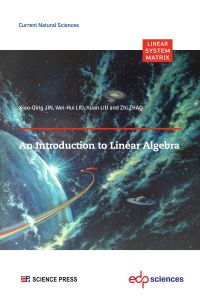An Introduction to Linear Algebra
Éditeur : EDP Sciences
ISBN numérique PDF: 9782759830459
Parution : 2022
Catégorisation :
Livres numériques /
Autre /
Autre /
Autre.
Formats disponibles
| Format | Qté. disp. | Prix* | Commander |
|---|---|---|---|
| Numérique PDF Protection filigrane*** |
Illimité | Prix : 95,99 $ |
*Les prix sont en dollars canadien. Taxes et frais de livraison en sus.
***Ce produit est protégé en vertu des droits d'auteurs.
Description
Linear algebra is a core course for science and engineering students in colleges and universities. It is one of the foundations of modern mathematics and has extensive and profound applications in physics, computer science, engineering, economics, etc. This book aims to help readers acquire the basic knowledge of linear algebra and lay the ground for further study of mathematics courses. It is intended for first-year undergraduate students in engineering, science, and other areas related to mathematics. It is also suitable for self-study. This book is organized into eight chapters and the main contents include linear equations, basic operations of matrices, determinants, vector spaces, eigenvalues and eigenvectors, linear transformations, etc. In the eighth and last chapter, the authors draw on key concepts presented in the previous chapters in the book to give an elementary proof of the recently proposed Böttcher-Wenzel conjecture. In addition, the appendix provides a preliminary discussion of the independence of the axioms of vector spaces. The book provides simple exercises for tutorials and more challenging exercises for student practice.























